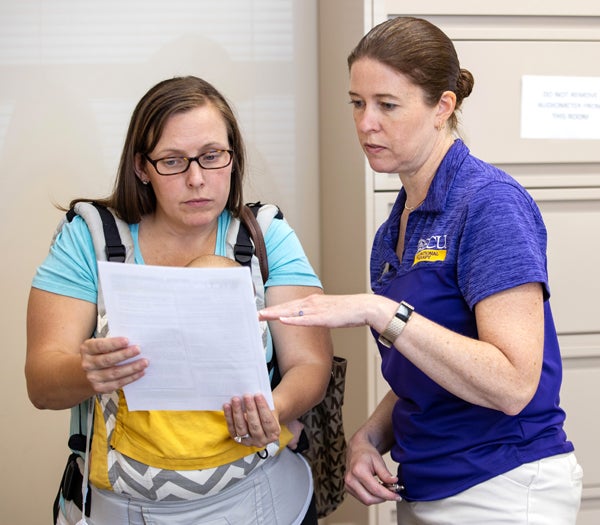Donica tapped as new occupational therapy chair
The new chair of ECU’s Department of Occupational Therapy in the College of Allied Health Sciences hopes to retain the department’s stellar reputation and its balance of research opportunities to clinical training while adding new opportunities for student learning.
Dr. Denise Donica, who is in her 11th year as a faculty member of the Department of Occupational Therapy, was recently named the new chair of the department, which trains students to treat those who are injured, ill or disabled and help them to build and maintain the skills needed for living and working.

As chair, Donica said she plans to emphasize interprofessional experiences for students, aligning with the priorities of the College of Allied Health Sciences and the Division of Health Sciences at ECU.
“We’re really trying to establish more interprofessional education and practice opportunities,” she said, pointing to an annual fall-risk assessment event for older adults – in which the department collaborates with the Departments of Physical Therapy and Physician Assistant Studies – as a prime example.
“We’re trying to provide a service to the community while the students are getting to practice with real people and also work with the other disciplines that they will potentially work with out in the field.”
In May, the department also partnered with the Department of Communication Sciences and Disorders for a screening event, adding occupational therapy components that included developmental screenings for children, ergonomic education and fall-risk assessments.
Donica said she is also working to implement more opportunities for students to develop leadership skills that they will increasingly need as the profession advances. The improvements, though, will not come at the cost of what the department already does well, she said.
“We have a really good balance between our research part of the program and our clinical skills,” she said. “All the students are involved with actual research projects — many of them intervention based — so a lot of them are serving the region through our research. But they also have those hands-on clinical skills. Our students come prepared to serve clients when they go out on their internships. That tends to be what we think is our strength.”
The department is in the process of creating a new clinical doctorate program, which Donica expects will open in the summer of 2023. Currently the department offers only a master’s degree option, admitting up to 26 new students per year.
“We are exploring offering a dual option where we offer a master’s or a doctorate,” Donica said. “The doctorate program would have additional expectations and it will open up opportunities to serve more of the region and develop things for people who don’t generally have access to occupational therapy services. We’re really excited about the possibilities with the new program.”
-by Natalie Sayewich, University Communications

Denise Donica, chair of the Department of Occupational Therapy, talks with Stephanie Howard about the results of her son’s health screening on May 31. (Photo by Rhett Butler)
As chair, Donica said she plans to emphasize interprofessional experiences for students, aligning with the priorities of the College of Allied Health Sciences and the Division of Health Sciences at ECU.
“We’re really trying to establish more interprofessional education and practice opportunities,” she said, pointing to an annual fall-risk assessment event for older adults – in which the department collaborates with the Departments of Physical Therapy and Physician Assistant Studies – as a prime example.
“We’re trying to provide a service to the community while the students are getting to practice with real people and also work with the other disciplines that they will potentially work with out in the field.”
In May, the department also partnered with the Department of Communication Sciences and Disorders for a screening event, adding occupational therapy components that included developmental screenings for children, ergonomic education and fall-risk assessments.
Donica said she is also working to implement more opportunities for students to develop leadership skills that they will increasingly need as the profession advances. The improvements, though, will not come at the cost of what the department already does well, she said.
“We have a really good balance between our research part of the program and our clinical skills,” she said. “All the students are involved with actual research projects — many of them intervention based — so a lot of them are serving the region through our research. But they also have those hands-on clinical skills. Our students come prepared to serve clients when they go out on their internships. That tends to be what we think is our strength.”
The department is in the process of creating a new clinical doctorate program, which Donica expects will open in the summer of 2023. Currently the department offers only a master’s degree option, admitting up to 26 new students per year.
“We are exploring offering a dual option where we offer a master’s or a doctorate,” Donica said. “The doctorate program would have additional expectations and it will open up opportunities to serve more of the region and develop things for people who don’t generally have access to occupational therapy services. We’re really excited about the possibilities with the new program.”
-by Natalie Sayewich, University Communications